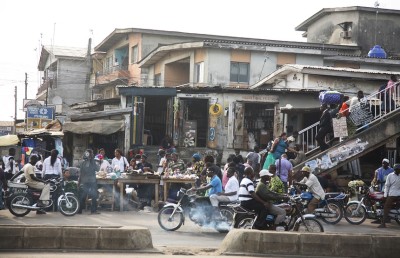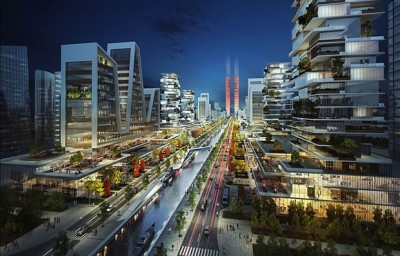There is a saying in Lagos, or a prayer, or perhaps the city’s version of God bless America. Èkó ò ní bàjé – “may the city not spoil”. One might wonder, upon hearing this saying, what it means for a city to spoil, to go bad, as would a fruit capable of decomposition.
Lagos was unspoiled in my eyes as a child. Although it was only a four-hour drive from Akure, where I was born and lived well into my teenage years, I never visited the city until I was 18. Lagos held a grand stature, evoked by the people who had visited or lived there. To the rest of us, Lagos was Europe within Nigeria. The children who came from Lagos were “tush” – well put together – and usually more enlightened, exposed to a better life, than those of us who lived on the outside of the city. It had the tendency to render everywhere else provincial. My uncle who lived and worked in Lagos was considered the grand person of the family, the one to whom we looked for many good things. For a very long time, I hoped fervently that he would take us to Lagos on a holiday. But it didn’t happen until 2004, when I had a gap year before college.
One thing that spoils Lagos, at least in the eyes of non-Lagosians, is crime. On my visit with my uncle, the city was roughly what I had been led to expect. Its streets were congested. People navigated through the tight roads in huge numbers. My uncle picked me up from a “garage,” a dirty commercial transport park, and warned me to keep keen vigilance, anya saa. I had heard the warning many times before: in Lagos, anything could be stolen – even a human being. My father used to tell the story of a friend he knew in the 1970s who drove a new car to a party. By the time he came out of the party hall, all four wheels were gone. Another frequent story was that you could keep your wallet in the inside pocket of your coat and someone would still manage to steal it. Whether by magic, or by trickery, I did not know.
My uncle and I walked for close to a mile on foot, crossing dangerous roads, stopping occasionally to buy bread, bananas and groundnuts off street hawkers, their trays balanced on their shoulders or heads. We arrived at a junction, where a few molue buses were parked, their drivers and assistants calling for “Isolo!” We hopped on one. My uncle, then a bank accountant, had come to pick me up straight from his office; in his suit and glasses, he must have reeked of opulence. Throughout the bus journey he kept an eye on me. It was jerky and rocky, through dense traffic and deficient roads. By the time we got out, both of us were soaked in sweat, and I was delighted to be able to breathe again, having almost suffocated on the bus. Suddenly, my uncle put his hand into his pocket and shouted. We looked back at the bus, but the assistant had mounted the door, banged it with his hand and shouted as it sped away. The wallet was gone.
As is often the case with things of great value and historical significance, there is a constant, hovering fear among those who love Lagos that something external, some negative force, people or events, will destroy it. And Lagos has indeed seen much that could have led to its destruction. The first European visitors to the port of Badagry, perched on the edge of the Atlantic Ocean, were the Portuguese in 1472, followed by a coterie of foreigners – including its future colonists, the British. The port gradually expanded, and became an easy transit port for the heinous transatlantic slave trade. Before the British arrived and chose Lagos as their imperial capital, the city saw wars and battles, kings dethroned and forced into suicide. Yet none of these wars spoiled or destroyed the city. In fact, they fed it, like beasts fattened on steroids.

While the trampling of traditional African culture under the elephantine foot of the British empire should have tainted Lagos, it transformed it instead into a western-like city in the heart of Africa. When the colonists finally left in October 1960, Lagos became the new nation’s capital and from Dodan Barracks, now a mostly dilapidated structure, coup after coup was plotted and squashed, military juntas unseated and enthroned. But none of them, no matter how violent, spoiled the city.
People from all around the country flocked to it, attracted by the promise of white-collar jobs in the colonial period, and of growing industrialisation and civil service in the years before the civil war. They still come, pulled by the myth that these opportunities still exist in abundance in Lagos in the new millennium. Lagos has swelled, gulped up surrounding cities, and even encroached, menacingly, into bordering states. The tide does not seem to abate. The Populations Reference Bureau predicts Lagos will double in size in the next 15 years. These new arrivals live in the lowest parts of the sprawling city, in places such as Ajegunle or Makoko, on less than a dollar a day. Overpopulation is what people expect will spoil the city now.

For years, Lagos’s notoriety stemmed from the agberos, the “area boys”. They live on the streets and act as arbitrary law-enforcement officers, robbers, teachers, traffic controllers, and just about anything they can – but, above all, as coercive tax-masters who impose illegal tariffs on the helpless, particularly small roadside businesses. These extortionists, too, could have spoiled Lagos.
But when I returned after a time away in 2010, the agberos were gone. I was shocked to see Oshodi bridge, and the Isolo and Bariga areas where they used to congregate, empty of them. Former governor Babatunde Fashola, who ran as the man who’d keep Èkó from going bad, had lived up to his billing. He’d even tried to fix the legendary congested traffic by introducing BRT buses, carving out separate lanes for them in the tight roadways.
The more pleasant portions of my first experience of Lagos – the sightseeing trips to the national theatre, the former national stadium at Surulere, the drive over the Third Mainland Bridge, which, my uncle told me delightedly, was the longest bridge in Africa – merely added to its stock. I realised I was experiencing a city that had no equal in Nigeria. It was expansive, noisy and effulgent. I loved its cosmopolitan attribute, its fast life and its complex beauty.
Even greater infrastructure is now springing up, including a light-rail project that was meant to start running in 2011 but has been mired in delays. The massive structures on which these trains would run crisscross the city, prominently along the greater Oshodi area. Other promised graces for the Lagos skyline include the extraordinarily ambitious Eko Atlantic project, dubbed Nigeria’s version of Manhattan.
While these projects aim to keep Lagos from going bad, the outlook remains dim. Lagos does not exist in isolation. It sits in a country that has wasted many decades of wealth and now – in the age of the oil market crash – has become poor. Nigeria no longer has enough income to run as it always has. Many of the city’s projects may never be finished.
But while their stagnation (or abortion) may not spoil the city, what could do so is the deterioration of existing social structures due to lack of funds, and the harsh living conditions of the bulk of the city’s millions of inhabitants, which could decline still further as the city adds hundreds of thousands of people every year.
As our future decays, cockroaches, ants and moths – the dark insects produced by such conditions – will thrive. The gaping holes on the roadways, the agberos, the congested traffic, the festering slums, the suffering – all could worsen. And it is these things, if something is not done to urgently change the course Nigeria is currently steering, that will spoil our beautiful, great yet fragile Èkó.
The Fishermen by Chigozie Obioma is published in paperback by ONE (an imprint of Pushkin Press) on 10 March
How is your Lagos changing? Is population growth affecting daily life? Share your stories and photos with Guardian Witness or on Twitter/Instagram using #GuardianLagos, and follow us on Twitter and Facebook to join the Lagos discussion all week long
END

Be the first to comment